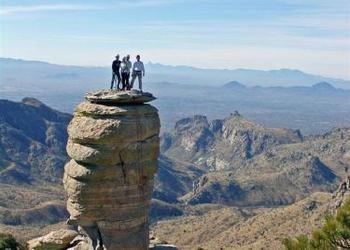Young Adults Learn Service, Leadership at Challenger II

Climbers' skill level ranged from experienced mountaineering to amateur, but all formed a solid team based on friendship and encouragement. The program emphasized challenging each individual to greater spiritual growth and leadership. Following is one participant's report.—James Capo, director
—by Caleb Janicich, with Andrew Beattie
As a poor college student needing to earn money over the winter break, I hesitated about attending this camp. I knew the program had a focus on leadership and challenge, but it was a letter from Mr. Capo that convinced me the lessons I could learn from attending—lessons that would benefit me for a lifetime—would be much more valuable than the little bit of money I could earn in a week. So I decided to go.
Before camp, I had started to question my role in the Church. I know that sometimes young people feel like they don't really have a role in their congregation, but this is an attitude and perception that needs to change. The camp placed an emphasis on servant leadership, and how as a group we need to accept ownership and responsibility in the Church. Now, at this very moment, young adults can help lead the Church in the right direction, not through positions or appointments or ordination, but through our willingness to serve and get involved. I believe this applies to everyone, not just to the young adults.
The Church of God is a family and a body. We are made up of many members, and we all have different abilities, skills and areas where we can serve. Having recently moved to a new church area, I had been waiting around for someone to ask me to do something.
What this camp helped me to see is that we do not need to wait to be given a job or position, but rather we need to find existing places where we might be able to serve, and then eagerly fill in where needed. This may be as simple as helping with coffee, greeting an unfamiliar face with a smile and a handshake or visiting the shut-ins or elderly.
An inspiring spiritual focus of the camp was on the correlation between rock climbing and our spiritual climb toward the Kingdom of God. Continual focus was placed on the overall camp theme: conviction, commitment and courage. In rock climbing you need to have a conviction of purpose and desire to climb, commitment to that conviction and the courage to continually advance on your climb.
In climbing, if you don't go for the next move, you will get burned out. Your arms and legs start to burn, and eventually you fall off the rock. The same thing can happen in our spiritual lives when we are trying to move forward. Sometimes we don't "trust the rock"—the next move looks a little scary, so we just sit in one spot waiting for a better hold, and we burn out. In our spiritual lives, we must have the courage to move forward even when the going is tough. Trust the rock, and commit to the move.
Sometimes going up to meet someone is scary. Sometimes raising your hand when the minister asks for volunteers is scary. But if we can take courage in the support of our brethren and the support from our great God, and volunteer, then we have taken the first step in truly becoming servant leaders.
Another lesson was that we need to learn how to make our holds/trials positive. In climbing and in life, we can encounter an overhang, a crack or a bump in the rock, and we have to make a nonintuitive move to make that hold "positive." We might have to lie back, "undercling" or "crimp" (a way to hold on to even tiny ledges).
These are all things that we don't do naturally. They are deliberate and forced actions, but they enable us to hang on and move up. We must trust that the rock will hold us, and have confidence that our belayer will catch us if we do fall.
This camp was meant to change our lives, and it showed me that the time to lead and to serve is now. We learned servant leadership, unity and to "tie in" with those we can trust who are belaying us spiritually. Challenger II also taught us that part of our responsibility in the family of God is to "be there" for God and each other, that we can each belay our brothers and sisters in Christ, to continually help each other upward toward our final goal, the Kingdom of God.
Each participant is now planning a service project in his or her local congregation to begin acting on the lessons learned in this program, and I encourage other young adults in the Church to step into their own service roles. UN


